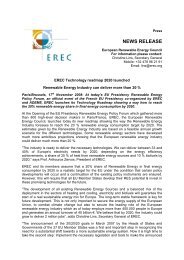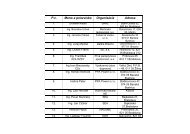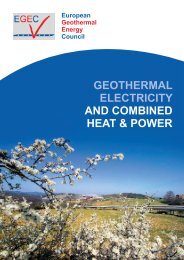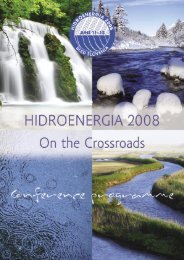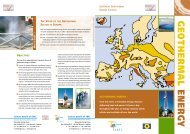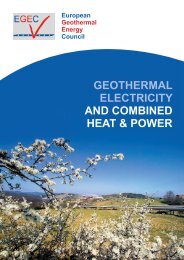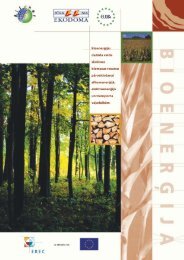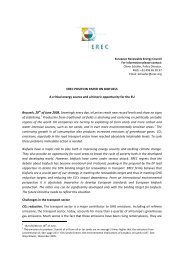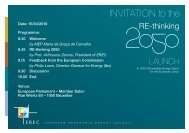CTO Assessment - European Commission
CTO Assessment - European Commission
CTO Assessment - European Commission
Create successful ePaper yourself
Turn your PDF publications into a flip-book with our unique Google optimized e-Paper software.
Independently from the support systems<br />
chosen at national level, public<br />
private partnerships are an effective<br />
means of bundling among other financial<br />
resources. There is also the<br />
possibility to involve the local community<br />
in a private-public pooling,<br />
by offering shares with high enough<br />
dividends, offering direct economic<br />
benefits and give the feeling to the<br />
community that it owns at least a part<br />
of the RES installation. One of the<br />
most successful cases is probably the<br />
one of the municipality of Eeklo. Situated<br />
in the Flemish region of Belgium,<br />
this municipality offered the<br />
possibility to deliver direct benefits<br />
to the residents through selling them<br />
shares at 250 Euro each and with 6%<br />
dividends. The other successful example<br />
is the one of the rural area of<br />
Powys who sold shares from the community<br />
wind turbine. This served not<br />
only to generate income but also to<br />
raise local confidence in the turbines<br />
through participation.<br />
On the same line we can mention community’s<br />
participation in the<br />
Heinerscheid Wind Farm. The interested<br />
parties founded the Wandpark<br />
Gemeng Hengsicht S.A. with a capital<br />
of 3,200,000 Euro, divided into<br />
12,800 shares at 250 Euro each. The<br />
local council is the legal holder of<br />
22.5% of the shares and aims to sell<br />
20% to the local community. This<br />
keeps the community involved with<br />
and concerned for the success of the<br />
wind farm.<br />
Likewise, in Slovenia a private-public<br />
pooling enabled to involve local<br />
community directly into several biomass-based<br />
district-heating systems,<br />
largely sponsored by UNDP and GEF.<br />
At the same time a Biomass Energy<br />
Fund was set up to distribute project<br />
funds to those applying through calls<br />
for tender. On Æro, the wind turbines<br />
and some of the district heating<br />
projects are funded by the sale of<br />
shares directly to the island residents.<br />
The same philosophy reigns in the El<br />
Hierro 100% RES project.<br />
A supportive programme of guaranteed<br />
quality standards and certification<br />
showed to be a successful innovation<br />
in two cases in particular:<br />
ADEME developed in the framework<br />
agreement (2000-2006) with the 26<br />
regions of France annexed to the<br />
State-Region contracts (CPER) a programme<br />
of support of RE technologies<br />
and EE measures. In order to allow<br />
a long-term sustainable market development,<br />
it was important to demonstrate<br />
that the programme offered guarantees<br />
thorough quality standards and<br />
certification, thus enabling the partnerships<br />
through the CPER contracts to<br />
have the RE sectors structures, organised<br />
and certified.<br />
On its side, the Walloon Regional<br />
Government of Belgium developed a<br />
voluntary “Soltherm” agreement<br />
(among what a “Soltherm” qualification<br />
system for SMEs to develop<br />
their know-how) for producers and<br />
installers to ensure quality, as a means<br />
to prepare supply and demand to<br />
match and choose solar thermal for<br />
the water systems.<br />
Especially in the industry, implementation<br />
of environmental measures can<br />
be very challenging and brings many<br />
benefits in return. This can be economically<br />
more profitable in some<br />
cases, and at the same time offers the<br />
opportunity to make the company<br />
known. A well-known case is the<br />
Fischer factory (world leader in ski<br />
and aeroplane components) who became<br />
the first factory worldwide to<br />
have been able to cover its heat and<br />
cooling needs with a tri-generation<br />
biomass plant. This has been enabled<br />
by an “energy contracting” arrangement<br />
concluded between the operator<br />
of the biomass plant and the ski<br />
producer.<br />
In the building sector we find very<br />
innovative aspects in some initiatives<br />
such as the Paul-Löbe Haus that demonstrated<br />
the importance of considering<br />
the multi-functionality of PV systems.<br />
In this sector the exemplary<br />
experience of Kronsberg, an innovative<br />
building area, stands out for the<br />
concerting system developed. The concerted<br />
approach in this case took place<br />
among the Council, the environmental<br />
and consumers groups, as well as<br />
with investors, architects and housing<br />
companies, resulting in the design<br />
of an energetically sustainable<br />
city with parameters comparable to<br />
standard market costs.<br />
Implementation of energy solutions<br />
based on renewables started to be<br />
turned into a factor of innovation for<br />
competitivity in emerging sectors with<br />
high potential such as tourism. The<br />
Biosphere Hotels experience, redrew<br />
hotel certification systems and quality<br />
standards including renewables as<br />
a compulsory requisite, combining<br />
therefore accommodation quality with<br />
RES. At a local level, we find the<br />
Green Hotels experience of Madeira,<br />
where a new tourist concept including<br />
renewables as a fundamental aspect<br />
of marketing and accommodation<br />
quality is promoted. A similar<br />
single case is the Hotel Victoria in<br />
Freiburg, which differentiates the<br />
RES dimension in its offer, an impor-<br />
Achievements and lessons<br />
31



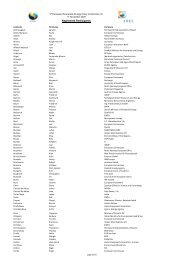
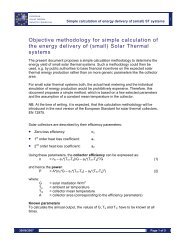
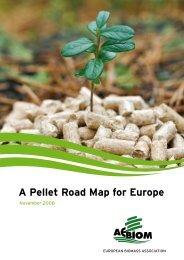
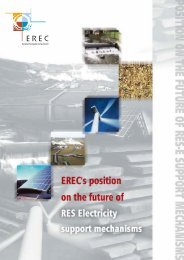
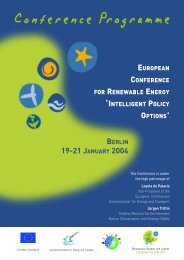
![Energy [R]evolution - Greenpeace](https://img.yumpu.com/47174859/1/184x260/energy-revolution-greenpeace.jpg?quality=85)
